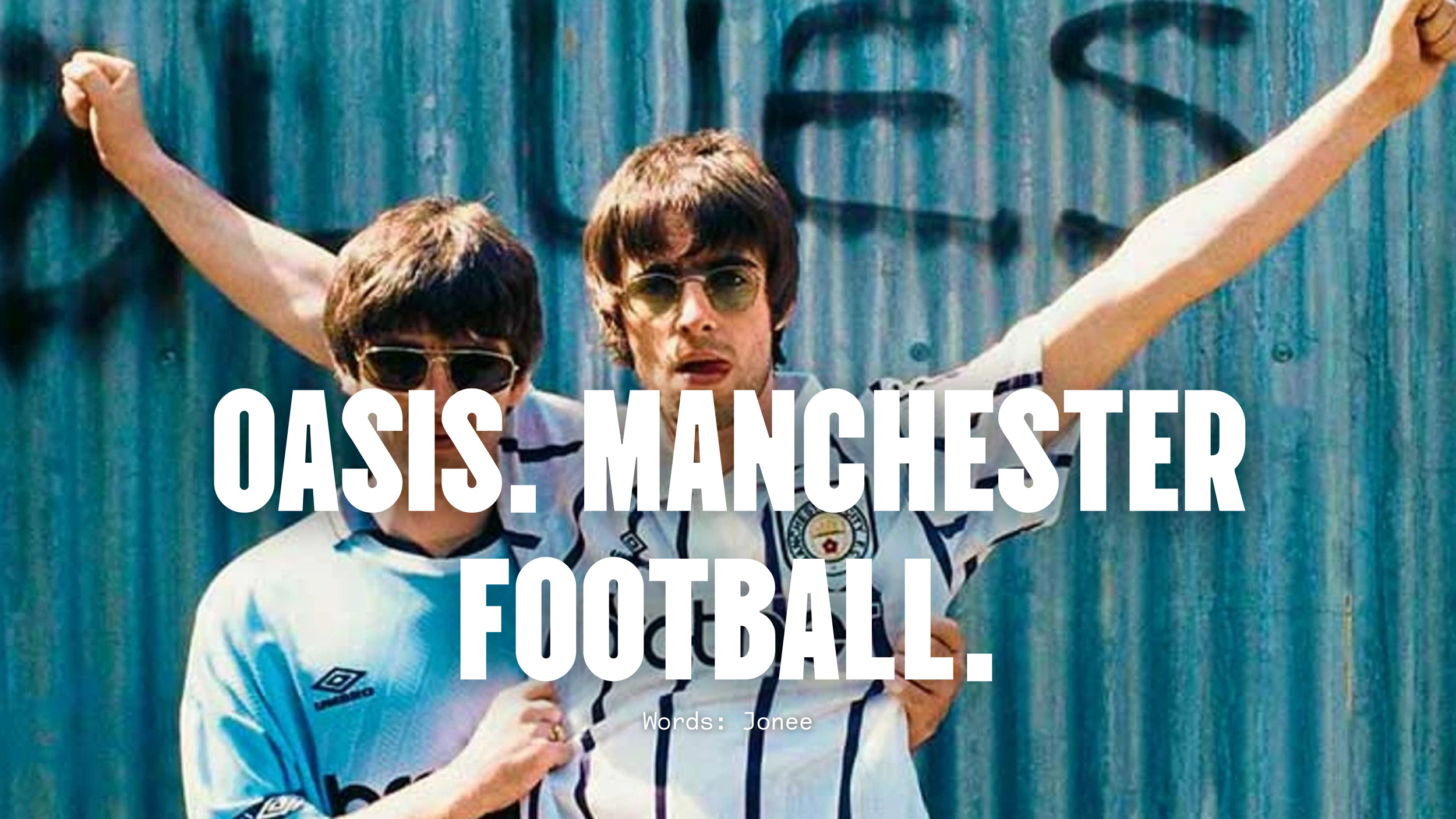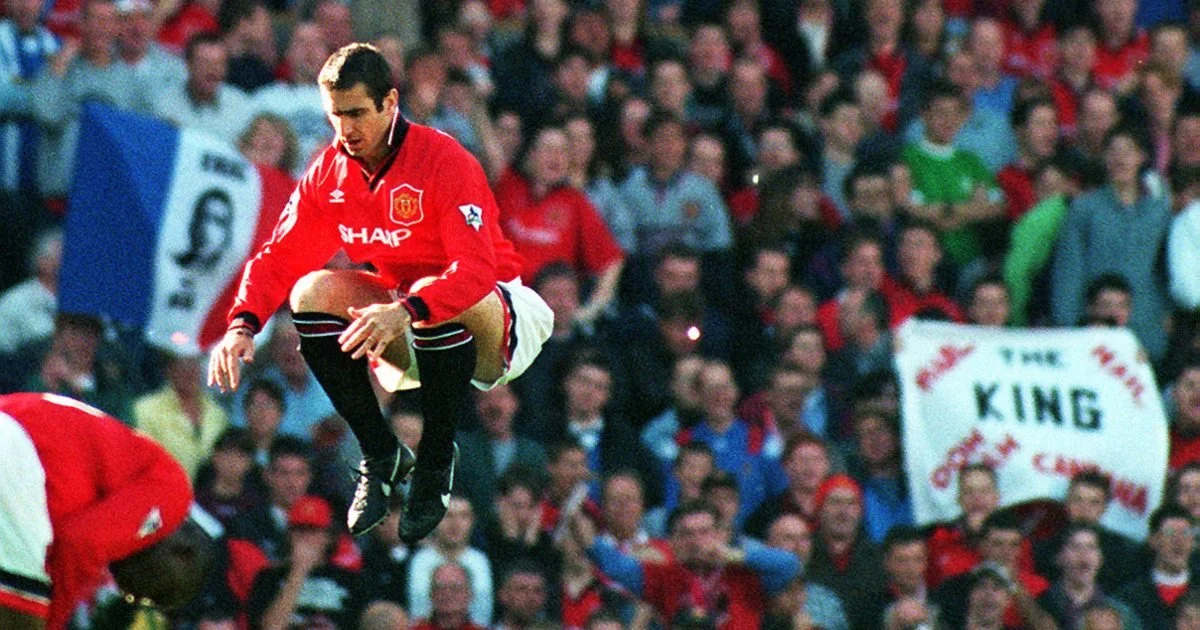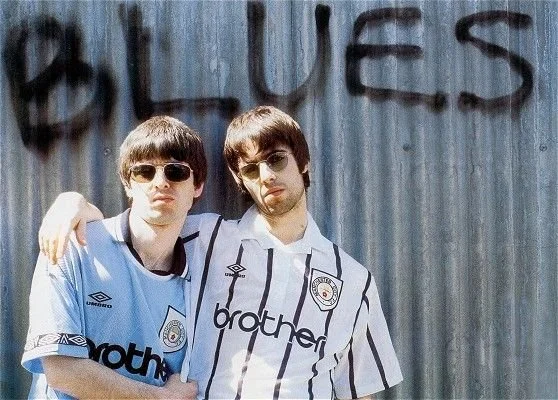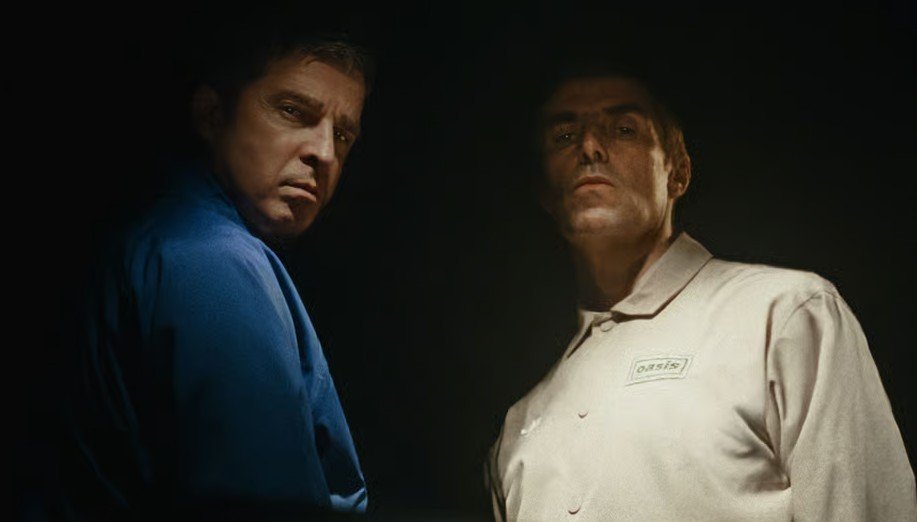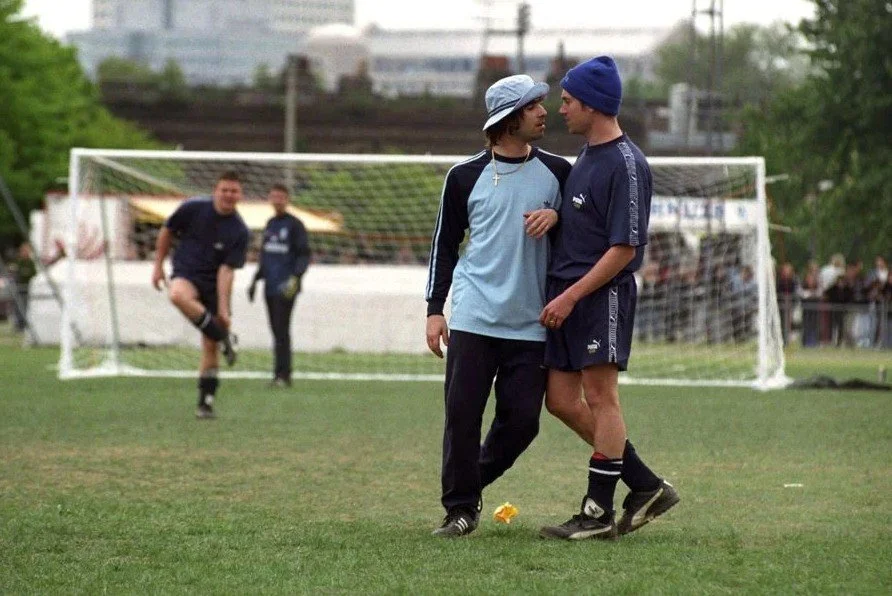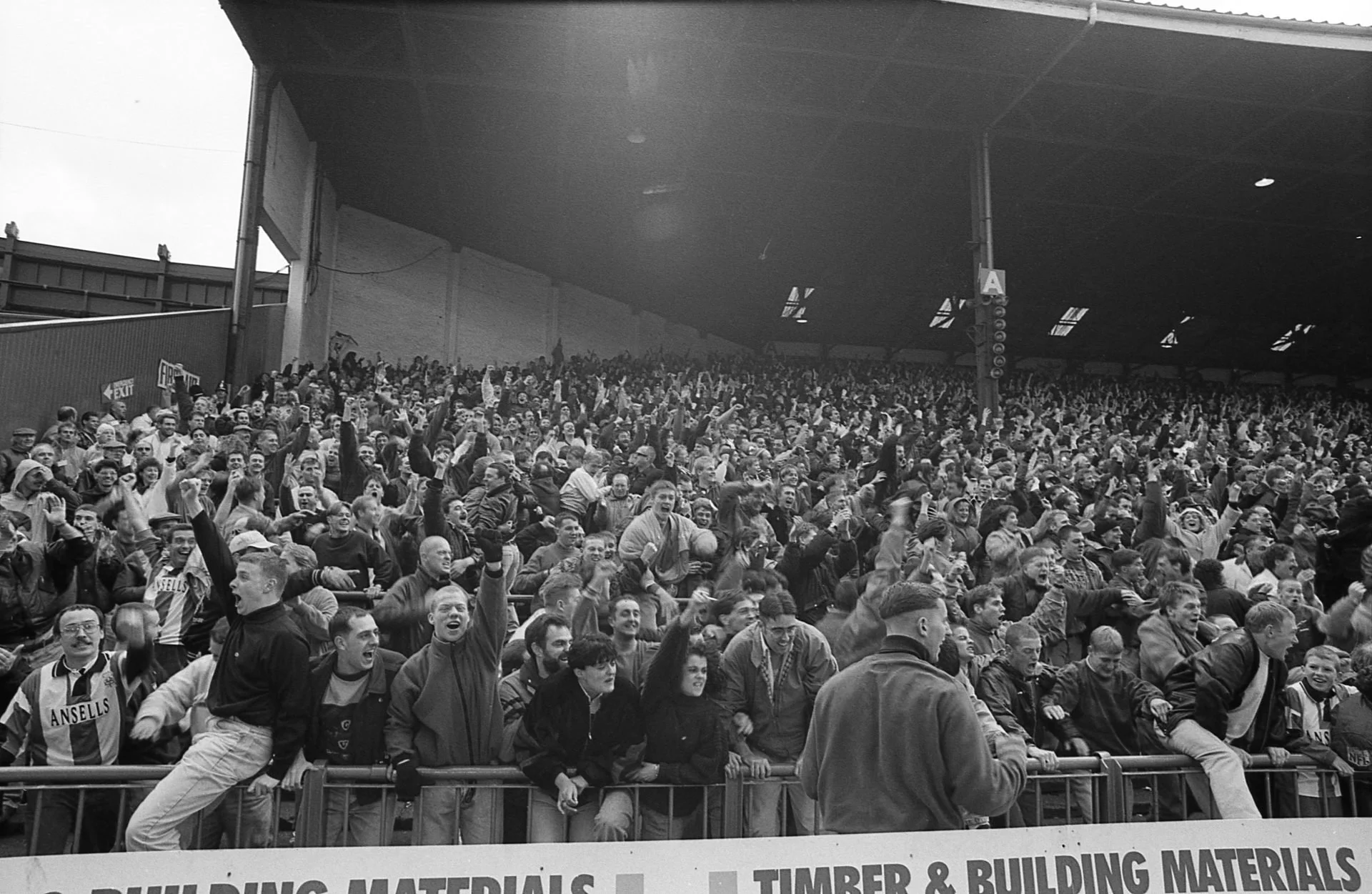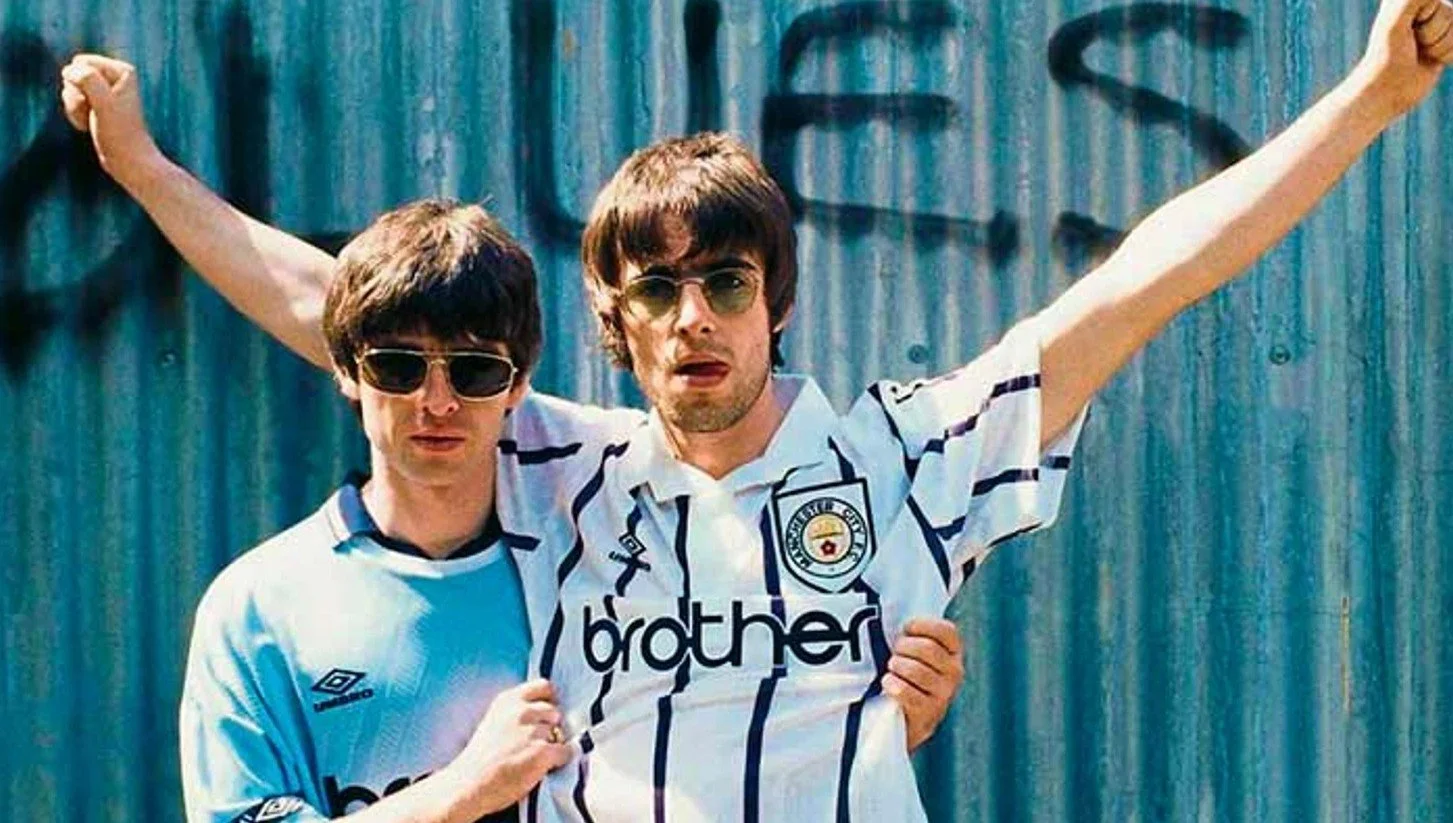
Words by Jonee | Published 11.07.2025Oasis is back! You might be wondering, isn’t this supposed to be a football article? Bear with me. We’ll get there soon enough.
Oasis have been a mainstay during my life, not just for their music but also for their deep connection to football. Growing up in Portugal as a passionate admirer of British culture, it was inevitable that Oasis would weave their way into my world – and they did. Their swagger, love for Adidas clothing and trainers, fervent support for Manchester City, and, above all, their almost reverent admiration for Eric Cantona – the King of Manchester and a legend for their bitter city rivals – left a mark on my teenage years. For me, the Premier League, Manchester, and its clubs are inseparable from the spirit of Oasis.
Music and football have been intertwined from the start, a dynamic that persists today. At any match, music blares through the stands, with every club and supporter group boasting its own songs and chants. Players rely on anthems to psych themselves up or celebrate victories, while musicians champion their clubs, some becoming integral figures in the fanbase, others joining the stands as passionate supporters, chanting and cheering. Rock, the music of the people, naturally aligns with football, the sport of the masses. After all, we’re simple creatures: give us a searing guitar riff and a footballer weaving magic with a ball, and we’re content. It’s that simple.
Growing up, Eric Cantona loomed large in my imagination, his presence towering over all others. Paired with Oasis’s rock’n’roll anthems and their outspoken devotion to him, this created an intoxicating blend of admiration for a young fan like me. To me, English football has always been the punk rock of the beautiful game, defined by larger-than-life characters, clashing titans, players with dazzling skill and fiery tempers, audacious plays, and wild stories—all intricately woven together.
For all its love of manners and propriety, the UK is a hotbed of exhilarating madness and rebellious subculture, and football embodies this chaos. My generation grew up expecting Stuart Pearce to unleash havoc, Vinnie Jones to lose his cool spectacularly, Gazza to burn like wildfire, and David Seaman to sport that unforgettable moustache. Yet above them all stood Eric Cantona, a figure so singular he transcended club rivalries. He embodied English football, Manchester, and rock’n’roll. Amid this, my love for the Premier League still pulses fiercely. When Oasis announced their reunion, whether I shed a tear or not, the joy was overwhelming—a piece of that era, those glorious days, had returned. That feeling is magnified a hundredfold because this fella, now a proud Northerner, British, and Mancunian, feels a little closer to the era I grew up idolising.
Eric Cantona symbolises the attitude and culture of English football in the 90s.
Photo Credit: Planet FootballManchester, in many ways, stands as the UK’s most vital city. Though London may always be the towering, all-consuming elder sibling, Manchester and the North West have not merely earned but seized their place on the world stage, particularly in football and music. Side by side, they’ve become global powerhouses. I firmly believe certain cities transcend their physical form, becoming almost ethereal entities defined not by buildings or history but by their people—what they are, achieve, and represent.
Manchester is such a place. Its reputation captivated me long before I set foot here. There is no Manchester football without the anthems of Oasis or the Stone Roses, nor without the larger-than-life characters like Cantona and Balotelli, or the genius of Sir Alex Ferguson and Pep Guardiola. Equally, the city pulses with the guitar riffs of rock stars who proclaim their love for its clubs at every turn. This is a beautiful thing—a city embracing its multitude of voices. Football unites us, music envelops us, and together they thrive. Manchester is the cultural crossroads for each of these things.
To many, Oasis are larger than life—I see it daily. To others, they’re a nuisance, perhaps overrated. To me? They’re perfect, embodying exactly what Manchester needed: brash, loud, unapologetically defiant representatives of the city. Are they the greatest band ever? No. Similarly, Manchester United and their fans boldly claim to be the world’s biggest club—which they aren’t. But it’s not about truth; it’s about attitude, boldness and swagger. You have to admire, or at least respect, that audacious passion.
Oasis represent that same passionate madness, mirrored daily in English football. Other leagues may boast greater skill or organisation, but none captivate like England. Travel the world, and you’ll spot an English team’s kit. The UK grapples with countless challenges, some insurmountable. Yet, above all, it wrestles with a bold claim: that it’s the greatest place on Earth. Like Oasis or United’s boasts, it may not be true—but to us, it feels like it is. Let me share a secret: becoming British, a Northerner, a Mancunian, is the greatest thing that’s ever happened to me. It’s about the quiet privilege of joining the passionate madness that has defined this land for centuries.
The Gallagher Brothers have long married their love of Manchester City with their music.
Photo Credit: Kevin Cummins // Getty ImagesNow, back to football—and Oasis, but mostly football. Manchester holds the rare distinction of being one of only two cities—alongside Milan—with two clubs that have won the Champions League. That’s the entire list, and it’s unlikely to change soon. Funnily enough, though I live in Manchester, my heart belongs to neither City nor United but to one club alone, unwaveringly. Yet, I’ve had the joy of watching my favourite manager at City and many beloved players don the shirts of both Manchester clubs. It’s been a remarkable experience. Football fandom offers endless shades of passion, ensuring there’s always something to cherish.
Between Pep’s all-seeing eye at Manchester City and the relentless chaos at United, you’d be forgiven for feeling like Manchester is the heart of the football universe. An exaggeration, perhaps, but in many ways, Oasis are much the same. People mock their chaos, their swagger, their fractious sibling dynamic, yet they remain ever-present. When they announced their comeback, fans—City and United alike—lost their minds. They might just be the one force that unites these rival supporters. And if you, dear reader, despise them? That’s fine. They know you’re aware of them, and for Oasis, that’s victory enough. Pack the rest in, mate. Football and rock’n’roll are like siblings—distinct yet inseparable, bound in a wonderfully complex, symbiotic dance. One would falter without the other.
Let’s reflect on kit culture and terrace fashion. For many, Adidas has crafted some of the greatest football kits ever. It’s no surprise, then, that Adidas and Oasis have been a natural pairing from the start. The band members, proud fans of the brand, have forged a full-fledged union, with vibrant marketing and merchandise emblazoned with their names. Some brands, bands, and clubs are simply meant to be connected, intertwined in spirit.
The 1990s, in many ways, feel like our peak years—or so our minds like to convince us, nostalgia painting the past in brighter hues. The Premier League, still a rebellious infant in the ‘90s, had just kicked off, and alongside it came Oasis, their stadium anthems and swagger rivalling any football star. It was as if football craved its musical counterpart, and Manchester delivered. United dominated the decade, and in true Mancunian style, the city also birthed the era’s biggest band. Why settle for one when you can have both? Growing up, I watched that United side terrorise all comers, including my beloved FC Porto, with icons like Giggs, Beckham, Schmeichel, and the god among players, Eric Cantona. I wasn’t a fan, but I was an admirer. Meanwhile, Definitely Maybe and (What’s the Story) Morning Glory? spun endlessly in the background. Give me a football city pulsing with rock’n’roll, and I’m sold. Did this duo—football and Oasis—draw me to Manchester? Absolutely.
The Gallagher Brothers appear together on an Adidas advert after announcing their tour.
Photo Credit: NMEWhen we think about the 90s, it’s like our brains have slapped a filter on the whole decade. Maybe it was peak culture, maybe it’s just nostalgia playing tricks, but who cares? That’s how it works—the past always feels a bit more epic. In Britain, the ‘90s were a proper riot, with football and music smashing together like a perfect tackle and a guitar riff in one glorious moment. For me, a lad growing up far from these shores but mad for all things British, this era was everything. And at the centre of it? Manchester, the city that didn’t just join the party—it kicked the door down, shouting, “We’re here, and we’re massive!
The Premier League was brand new in 1992, a cheeky upstart that ditched the old First Division’s dusty rulebook. It was like a teenager with a leather jacket, full of attitude and ready to take on the world. This wasn’t your grandad’s game—it was loud, flashy, and packed with players who weren’t just athletes but proper characters. You had blokes who’d dazzle with a nutmeg one minute and lose their rag the next, their tempers as big as their skills. Managers were larger than life too, pacing the touchline like rock stars, their tactics as bold as a frontman’s strut. The terraces were alive with chants, each club with its own battle cry, and the stadiums pulsed with music before, during, and after the whistle. It was chaos, passion, and pure theatre rolled into one.
Then there was the music. Britpop exploded in the ‘90s, and Manchester was its spiritual home. Bands swaggered onto the scene with anthems that filled arenas and pubs alike, their lyrics dripping with working-class pride and a “we’re untouchable” vibe. These weren’t polished pop stars—they were lads you’d see in the stands, pint in hand, belting out tunes about life, love, and taking on the world. Their music was the perfect match for football’s energy: raw, defiant, and unapologetically loud. You’d hear their songs blaring at matches, fans turning verses into chants, and players psyching themselves up with the same tracks. It was like the music was the game’s heartbeat, each feeding off the other’s fire.
These bands didn’t just love football—they lived it. They’d rock up in tracksuits, their style as bold as a winger’s run down the flank. They backed their clubs with a passion that rivalled any diehard fan, some even weaving their team’s colours into their identity. Manchester’s music scene wasn’t separate from its football—it was its twin, both shouting the city’s name to the world. That’s the Mancunian way: go big or go home. Football and rock’n’roll were like siblings in the ‘90s—different vibes, same DNA. The Premier League needed its soundtrack, and Britpop delivered. Rock was the people’s music, football the people’s game, and together they were unstoppable. Give me a killer riff and a striker banging one in from 30 yards, and I’m happy.
Oasis and Blur play against each other in a charity match in the 90s.
Photo Credit: Far Out MagazineManchester is a state of mind. Forget London’s big-brother act; Manchester didn’t ask for a seat at the table—it built its own. It was about its people, their grit, their dreams, their identity and their culture; all expressed in the boldest way possible, in the only way Manchester knew how. Manchester embraced its chaos, its multitude of voices, and turned it into something magical. Football united us, music wrapped us up, and together they made the city feel like the centre of the universe.
Kit culture was where it all came together. Certain brands crafted kits that weren’t just shirts but statements. They were worn by heroes, chanted about by fans, and turned into instant legends. The bands loved them too, strutting in the same gear like they were born in it. It wasn’t just fashion—it was a badge of belonging, a way to say, “I’m part of this.” Some brands, bands, and clubs were just meant to be mates, their spirits intertwined like a perfect through-ball.
For me, the ‘90s were a fever dream. I wasn’t a fan of Manchester’s giant, but I was hooked. The league’s global pull was unreal; you’d see English kits everywhere, proof of its mad influence. And the music? It was the soundtrack to my teenage years, blasting through my headphones as I dreamt of Britain. When those bands announced their reunion years later, I won’t lie—it hit me hard. It felt like coming home.
I get to live in this passionate madness. Manchester’s football legacy is unreal. Living here, I’ve seen managers and players I love light up the pitch, even if they’re not in my club’s colours. Football fandom has layers, and there’s always something to cherish. Did the ‘90s, with its football and rock’n’roll, pull me to Manchester? You bet. Give me football, rock’n’roll, and Manchester, and I’m in for life!
Stoke v Port Vale at the Victoria Ground, showcasing the highlights of Terrace Culture.
Photo Credit: Tony DavisNow, in 2025, Oasis are back—reunited after years apart, ready to light up Manchester with that same mad energy. The city’s buzzing like a packed terrace, the Premier League’s bigger than ever, and Manchester City and United are still at each other’s throats, just like the old days. It’s like the ‘90s got a fresh kit and a louder amp. I’m delighted to be here, living in this passionate madness. Oasis’s return is a full-on revival of Manchester’s soul, tying together its football, music, and defiant attitude that makes it feel like the centre of the universe. It’s about what the band stands for in the context of Manchester and what it means to be Mancunian: being loud, proud, and unapologetically themselves.
That’s Manchester’s attitude in a nutshell. This city doesn’t ask for a spotlight—it grabs it and shines it on itself. United and City might bicker over who’s top dog, but both carry that Mancunian chip on their shoulder. United’s got a trophy cabinet that screams history, while City’s recent dominance shows they’re no longer the noisy neighbours. It’s not just about being the best, but acting like you are too. You need to carry that endearing, confident arrogance with you. The same goes for the bands. They don’t need to be everyone’s cup of tea; they just need to be loud and true to their roots. Their 2025 reunion is a reminder that Manchester’s spirit doesn’t fade—it just gets louder, like a chant rippling through the stands. Kit culture’s part of the magic too. In the ‘90s, those kits were everywhere, tying the music and football worlds together. Now, with the bands back, it’s like those iconic designs are strutting the stage again.
Football and rock’n’roll—punk and heavy metal, mostly—form the bedrock of who I am. The attitude of my club and its players shaped me, while the music I grew up with painted the full picture. A loud track was always spinning on the record player, a football match always roaring in the background. They were inseparable, none more so than Oasis and Manchester—twins, rivals, bursting with passion and swagger. Are there better places than this city? Sure. Is there anywhere else I’d rather be? Not a chance. So today, when I blast Oasis, I’m not just hearing music—I’m reliving the flair of a collar-up king, the wild chaos of a Geordie genius, and the raw chaos of English football in the 90s. These legends, and so many others, live in me forever, tied to Oasis’s anthems. Like great songs, great players never fade. As Oasis might say, you football and I are gonna live forever!


